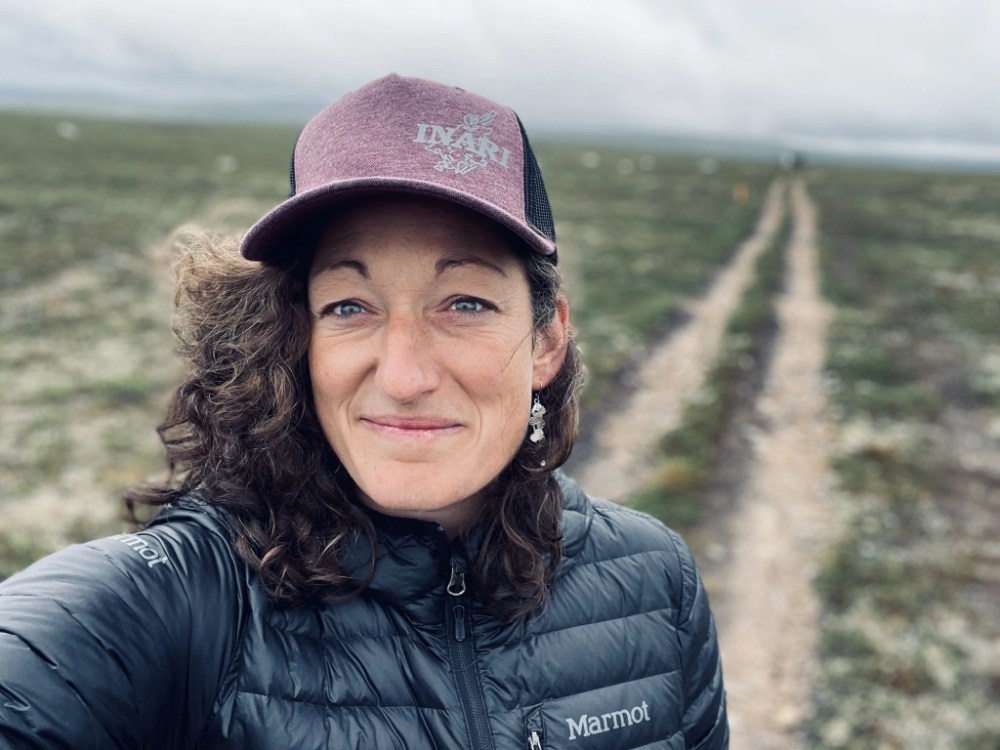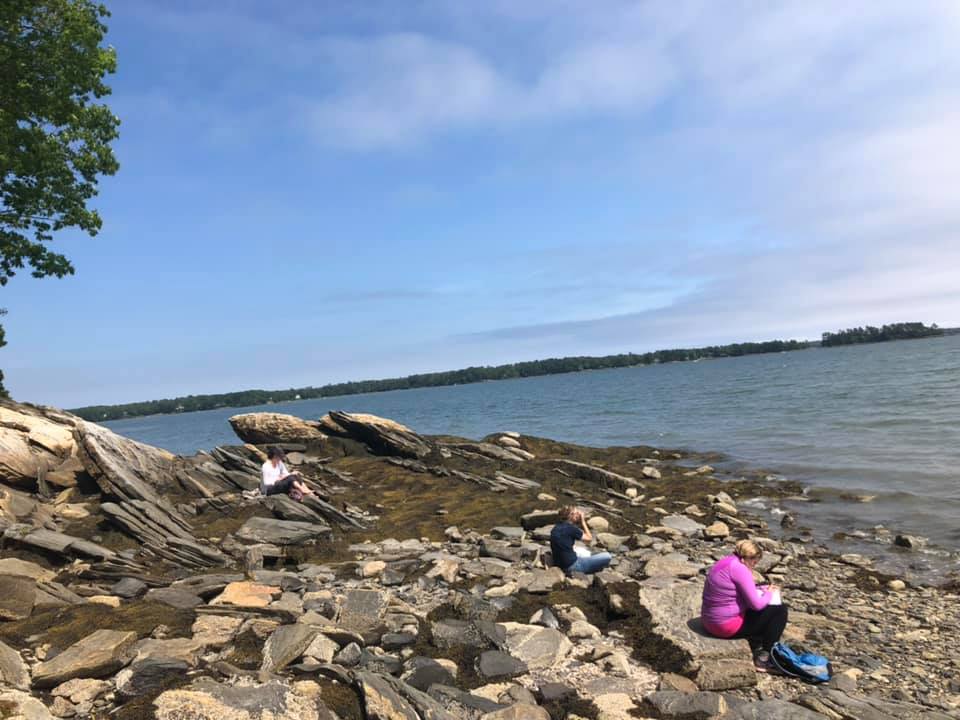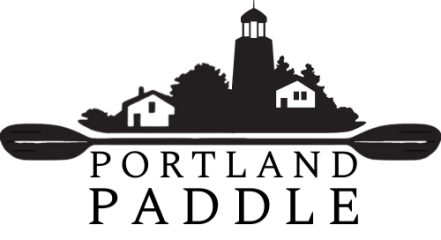Interview with Jenny O’Connell: Author, Teacher, Activist, and Guide
Award-winning author Jenny O’Connell is joining Portland Paddle this summer to offer an adventurous three day writing retreat on Casco Bay’s islands. We sat down with Jenny to learn more about her career, the workshop, and other adventures she has gotten up to recently.
Eric Nathanson: How long have you been a guide?

Jenny is a Maine author and long time adventure guide
Jenny O’Connell: 15 years this summer! I am so grateful to have a career that’s allowed me to experience this world through joyful movement. I’ve traveled all over the globe guiding backpacking, sea kayaking, cultural exchange, winter adventure, and river expeditions from the Peruvian Andes to the wild waters of my home state of Maine. Seeing adventures on the calendar still makes me giddy. This summer I took Portland Paddle’s Maine Sea Kayak Guide Training Course to prepare for getting my sea kayak category Maine Guide’s license.
Eric: And how long have you been a writer, and how would you describe your writing style or genre?
Jenny: Ten years! But I still don’t have words to explain how the time passes so quickly. Though I teach all genres, I write creative nonfiction. My heart project for the last nine years (and the book that’s made me a writer) is Finding Petronella, an adventure memoir I’m writing about my journey across Finland’s Arctic Circle in the footsteps of a legendary woman. My Substack, Wild Story, explores the place where a life outdoors meets the creative journey. I also freelance for magazines.
My work often revolves around themes of outdoor adventure, wilderness, environment, vulnerability, feminism, risk, and joy; and strives to connect people to themselves, each other, and the planet. We live within cultural systems that make us forget we are alive. I feel like my job as a writer is to tell the stories that help us remember.
Eric: When you’re not writing or guiding, how do you spend your time?
Jenny: Ultimate frisbee, disc golfing, salsa dancing, hiking, dipping in bodies of water, chasing sunsets…really anything that lights me up. Lately that’s also been quieter things, like reading in the grass, slow cooking, smelling lilacs, and singing. Fun fact: before I was an outdoor guide or a writer, I was a musician. I just started a band with Portland Paddle’s own Zack Anchors on drums! We’re taking band name suggestions.
This will be my 20th year playing ultimate. I captain an amazing women’s + nonbinary club team in Maine called Frolic, and you should definitely check out Maine’s pro team, Portland Rising!
Crooked River Source to Sea Expedition
Eric: You just got back from a several day journey through western and southern Maine, following the path of the Crooked River, which feeds into Sebago Lake, which then feeds into the Presumpscot and empties in Casco Bay. How did this trip come together?
Jenny: It all started with my friend, professional outdoor photographer Andy Gagne. (Andy and I actually met working as sea kayaking guides for Rippleffect back in the day!) He lives up in Norway, ME and loves to fish and paddle sections of the Crooked, which is how he got curious about the land trusts working to conserve the forest around the river. Andy and I collaborate on magazine stories that connect readers to the planet, highlight sustainable solutions, celebrate individuals and organizations creatively working to protect wild places and natural resources, and center around inclusivity and representation in the outdoors. (You can check out some of our work here.) So this was right up our alley.
This May, during National Drinking Water Week, we set out on a source to sea expedition, kayaking 100 miles via the Crooked River to Casco Bay with a small team of environmentalists and adventurers. In addition to Andy and myself, we were also joined by adventure friends Alex Kerney, who’s day job is at the Gulf of Maine Research Institute, and Charlotte Nutt, who is currently running for Maine state House District 79 as an Independent, where she hopes to address sustainability and livability issues for rural Mainers and small towns.
We wanted to tell the story of our water and transport our audience into the watershed, demonstrating how the rivers, forests and wildlife are all so connected to the faucet. We also got to meet the people and organizations who are working together in unique and creative ways to protect Maine’s forests and waters for future generations.
Eric: Why was this trip important to you? What is your personal connection to the watershed?
Jenny: I drink water every day, but before this project, I hadn’t actually thought all that much about where it comes from. The watershed we paddled provides one in six Mainers (not to mention our restaurants and breweries) with drinking water that is naturally filtered through the surrounding forests. But increased deforestation caused by Maine’s recent development boom could have a big impact on clean water. It’s a rare environmental story where humans haven’t destroyed the natural system yet…but the threat is real.
I’ve been reflecting a lot lately on how I can use my writing to meet the environmental moment we’re in. This project combines three of my passions – adventure, writing, and the environment – and it felt like a chance to put my money where my mouth is.
Eric: What was preparing for the trip like? Logistics, fundraising, skill building, etc.
Jenny: For me it was a bit of a learning curve – I had never whitewater kayaked before! I’ve been a river guide, and I’ve taught sea kayaking and whitewater canoeing, but I learned to whitewater kayak specifically for this expedition. Andy and I also did a huge amount of logistical prep, lining up sponsorships; interviewing land trusts, wildlife biologists, Maine brewers, and environmentalists; and organizing boats and gear. It was a full time job for a while there, and it’s still going. Yesterday I got to interview a 90-year-old fish conservation legend. Never a dull moment!
Eric: Those were some funky boats you guys used – they’re pretty different from anything I’ve ever paddled. Can you tell us a little bit about them, and how you came across them?
Jenny: They were crossover boats we borrowed from a friend – big for whitewater, small for an expedition. Just the right size to carry all of our gear, but also a bit hard to navigate in rocky, technical rapids (which is every rapid on the Crooked!). They have hatches and skegs like many sea kayaks, but are otherwise designed like a big whitewater creek boat.
Eric: Could you give us a little snapshot of the trip itself? Following along on social media it seemed like you encountered a wide range of conditions, and I’m curious about some of the details of that. How many portages were there? How many rapids did you run? Did you clear downed trees, pull over beaver dams, find areas too shallow to paddle? Were the lake and ocean sections calm or rough? What were some particularly magical moments?
Jenny: Ha! Great question. Someone asked me recently if we’d do it again, and I said No, definitely not. It was a one-time thing. The route we took wasn’t really meant to be paddled. There were an incredible number of downed trees from recent storms blocking the river, and we spent a lot of time navigating through, over, or around them. The Presumpscot River has seven dams to portage. The Crooked River rapids were shallow, rocky, technical, and challenging, especially for me. I got hung up on a few rocks, and I swam one rapid. It was an exhausting trip, and we put our bodies through a lot to do it.
But it was beautiful – stunningly so. Bald eagles, loons, otters, salmon, deer, sunshine, rain, stars. The feeling you get when you’re on the river for days. The positive energy from the folks at Sebago Clean Waters and the land trusts we interviewed along the way. And one of the best parts was the surprise trail magic! People who had been following our journey showed up to help with portaging, or to bring cookies, hot chocolate, or soup. The kindness of strangers was overwhelming.
I think the most impactful thing for me was the act of literally following the journey of the water with my body. To understand the price of development, and the barriers to fish passage. To go deeper than the map, and know in my bones just how connected everything is. We kayaked 100 miles through so many bodies of water with different names, but it’s all just one river.
I am so excited to tell the story, and for the documentary that Maine Mountain Media is making about our journey.
A Writing Retreat in Casco Bay
Eric: Tell me more about the writing retreat you’ll be doing with Portland Paddle later this summer and where the idea came from?
Jenny: Over the past few years, I’ve been combining my love of guiding with my love of writing. There’s something really special that happens when people are outside, a kind of space that opens up for creativity. I’ve seen it again and again. You find a new way into a big question. You notice a detail and a whole story opens up. You write something that surprises you. And I love how sharing personal writing brings a group of people together so quickly.
Eric: What should participants expect from the retreat?
Jenny: A good balance of kayaking adventure, fun, and creativity. The wild beauty of Casco Bay. A deepened adventure experience that asks you to be fully present (& the joy and relief of that presence!). The satisfaction at the end of the day that comes from exercising both your body and your brain. Creative community. And hopefully, if I’ve done my job right, a little piece of writing (or a few!) that you’re excited about.

Writers practice their craft in a workshop on the Maine coast
The writing sessions I lead on my trips are designed for anybody, regardless of writing experience. All you need is a notebook, a good pen, and a willingness to show up and give it a go.
All genres and forms – nonfiction, fiction, poetry, songwriting (I’ll bring my glow-in-the-dark waterproof ukulele!) – are welcome.
Eric: Could you give us a little sneak peek of an activity you might do?
Jenny: A warm-up I like to do when we arrive at our first destination is a sensory inventory. It’s a guided exercise in which we write down everything we can see/hear/smell/touch/taste. And then you sit with what you’ve written for a moment, notice which details feel “hot,” and start a poem or a story from there.
This conversation has been lightly edited for clarity and context.
